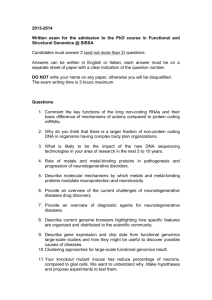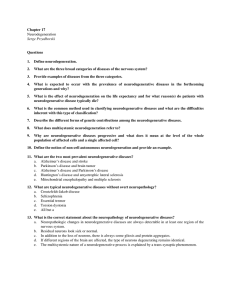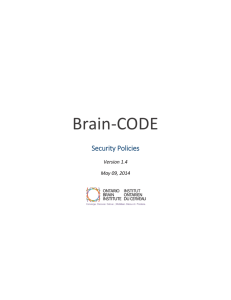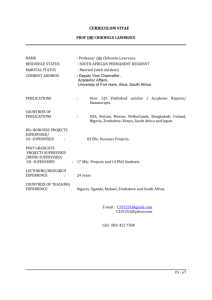Ontario Neurodegenerative Disease Research Initiative
advertisement
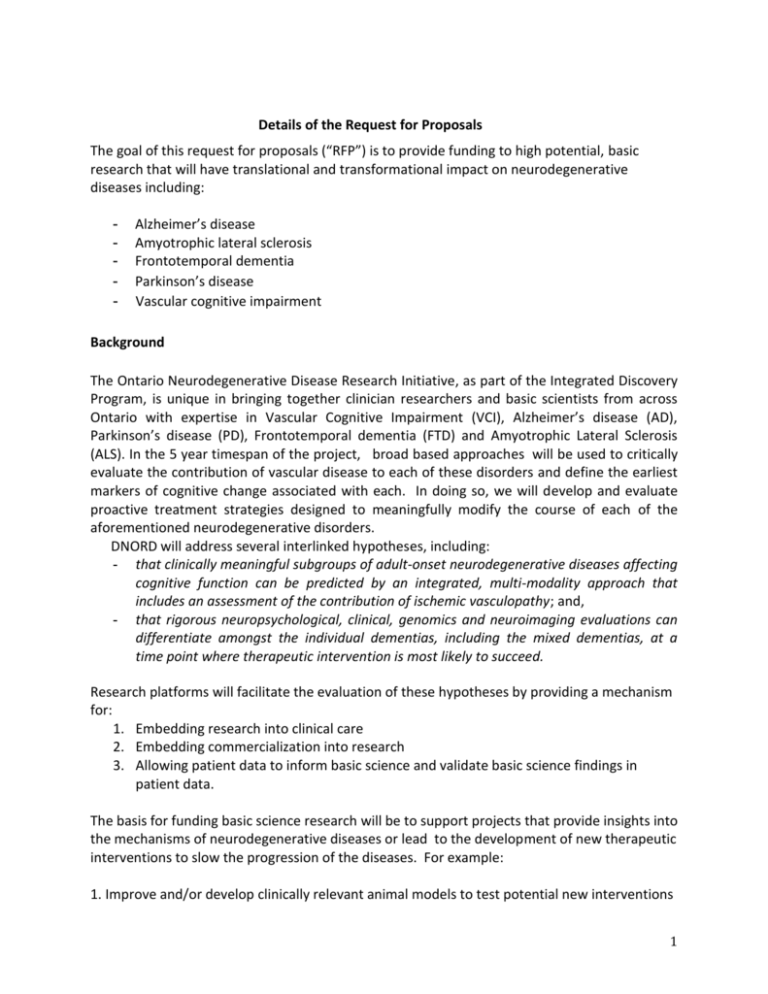
Details of the Request for Proposals The goal of this request for proposals (“RFP”) is to provide funding to high potential, basic research that will have translational and transformational impact on neurodegenerative diseases including: - Alzheimer’s disease Amyotrophic lateral sclerosis Frontotemporal dementia Parkinson’s disease Vascular cognitive impairment Background The Ontario Neurodegenerative Disease Research Initiative, as part of the Integrated Discovery Program, is unique in bringing together clinician researchers and basic scientists from across Ontario with expertise in Vascular Cognitive Impairment (VCI), Alzheimer’s disease (AD), Parkinson’s disease (PD), Frontotemporal dementia (FTD) and Amyotrophic Lateral Sclerosis (ALS). In the 5 year timespan of the project, broad based approaches will be used to critically evaluate the contribution of vascular disease to each of these disorders and define the earliest markers of cognitive change associated with each. In doing so, we will develop and evaluate proactive treatment strategies designed to meaningfully modify the course of each of the aforementioned neurodegenerative disorders. DNORD will address several interlinked hypotheses, including: - that clinically meaningful subgroups of adult-onset neurodegenerative diseases affecting cognitive function can be predicted by an integrated, multi-modality approach that includes an assessment of the contribution of ischemic vasculopathy; and, - that rigorous neuropsychological, clinical, genomics and neuroimaging evaluations can differentiate amongst the individual dementias, including the mixed dementias, at a time point where therapeutic intervention is most likely to succeed. Research platforms will facilitate the evaluation of these hypotheses by providing a mechanism for: 1. Embedding research into clinical care 2. Embedding commercialization into research 3. Allowing patient data to inform basic science and validate basic science findings in patient data. The basis for funding basic science research will be to support projects that provide insights into the mechanisms of neurodegenerative diseases or lead to the development of new therapeutic interventions to slow the progression of the diseases. For example: 1. Improve and/or develop clinically relevant animal models to test potential new interventions 1 for subsequent evaluation in phase II clinical trials; 2. Identify early gene and protein markers of cognitive change associated with each of the identified neurodegenerative disorders; 3. Discover new drug therapies or other interventions to prevent or slow cell death and cognitive decline in these diseases; 4. Develop sensitive preclinical cognitive test batteries for use across neurodegenerative disease states; 5. Perfect preclinical or clinical imaging methodologies for tracking structural and functional brain changes over time that can be related to behavioural outcome and inform both basic and clinical studies and, 6. Achieve a mechanistic understanding of how known disease related genes/biomarkers as well as additional markers identified through the patient/clinical platform contribute to development of vascular and neuronal pathophysiology leading to identification of appropriate clinical targets. OBI will commit up to $2.85 million over 4 years to the basic science funding program. Grants will be $150,000-200,000 per project per year. Grants can only be awarded to institutions located in the province of Ontario and priority will be given to those institutions that provide matching funds (1/3 of the total grant amount). Grants must involve at least two investigators. Timeline These timelines are approximate and may be subject to change. Announced RFA – July 15th, 2013 LOI Registration Deadline – August 15th, 2013 Proposals Due- September 30th, 2013 Funds released November 1, 2013 Application Process Registration All potential applicants are required to register their intent to submit a proposal by August 15th, 2013. The purpose of the registration is to guide the external review process and ensure the appropriate number of external reviewers. All registration requests for research will be prereviewed by a Scientific Advisory Panel to ensure that only relevant and high quality applications go forward for external peer review. At the registration stage the panel may also recommend collaboration between project teams or refocusing of the proposed project to better 2 meet the needs of the call. To register, please send the following information via email to BasicScienceRFP@braininstitute.ca. 1. Name of Principal Applicant and co-applicants (at least one co-applicant is required) 2. Primary Institution of Research of Principal Applicant 3. Proposed Project Title 4. A summary of the proposed project outlining objectives, approach and potential impact (not to exceed 350 words) plus 4-6 key words Application Guidelines Following receipt of an invitation to submit a full proposal, applications should be written in at least 11 point Arial font, margins of 25mm and be no longer than 5 pages. Additional information such as supporting figures, tables, etc, must be included in the 5 page application, no supplementary information will be permitted other than budget, NIH Biosketches, references (3 pg limit), letters of support (see section H) confirming matching funds (if applicable). Applications should include the sections/information described below. A. Applicant Information 1. Name of Principal Applicant and co-applicants (at least one co-applicant is required) 2. Primary Institution of Research of Principal Applicant 3. Application Title B. Objectives Clearly state the objectives of the proposed research. C. Approach and Impact Describe the proposed research approach and methodology. Discuss the potential impact for patients with neurodegenerative disorders in terms of potential new therapeutic interventions, early detection of disease or cognitive impairment, or insights into mechanistic underpinnings of neurodegeneration. Clearly indicate: 1. Milestones within a two-year period; 2. The skills/experience of the proposed collaborators D. Budget Include details on the research services, personnel, equipment, and other costs requested. Please note that allowable costs will be consistent with their institutional guidelines on eligible expenditures for research funding programs, which provide general information and description of allowable costs and activities. The funds can NOT be used to offset institutional overhead costs. 3 E. Curriculum vitae Each submission must include an NIH Biosktetch for each applicant. F. Letters of Support If applicable, please provide the following letters of support: A letter of support from the institution providing matching funding. The letter should indicate the amount committed, the timeframe of the commitment, and the applicant’s name. An authorized representative of the organization must sign the letter. Also include a letter of support from collaborating OBI scientists. Contact and Submission Information Applications should be sent electronically to BasicScienceRFP@braininstitute.ca by Monday September 30th, 5:00 pm EST. Review Process Complete applications will be assessed by a minimum of two external reviewers drawn from a pool of recognized experts outside the province of Ontario. Review Criteria Relevance to OBI and Neurodegenerative Diseases: Applicants should describe the alignment of the proposed project with the goals of the OBI neurodegenerative project. Criteria considered when reviewing Proposals: Innovation: The project should challenge current research thinking and paradigms and/or address unexplored areas. The potential of great scientific gain should offset the risk of failure. Applicants should emphasize the ways in which their project constitutes a unique, “outside-the-box” original investigation. - Experimental approach: Are the overall strategy, methodology and analyses reasonable and appropriate to accomplish the specific aims of the project? - Likelihood of success: How likely is the hypothesis to be proven? - Impact: If successful, will the project accelerate the development of therapeutics for neurodegenerative diseases? Additional criteria considered when reviewing Proposals: - 4 - Experimental approach: Are potential problems and pitfalls and areas adequately considered? Development plan for the therapeutic intervention: What are the steps after this study to continue development if successful? What if it doesn't work? Team and environment: The quality, track record of the team and the research environment. Does the project leverage unique capabilities/features of either? Budget and timeline: Are the proposed budget and timelines justified and realistic? Are matching funds available? Funding Details and Requirements Overall funds: OBI will provide up to $2.58 million to fund projects selected through this RFP process. Grants are contingent on the receipt of a sufficient number of high quality applications but it is anticipated that 3-4 grants will be funded per year in the first 2 years with continued funding contingent on grantees meeting milestones and providing deliverables including submission of progress reports at 1 year intervals and participation in OBI annual assessment meetings. Continued support is contingent upon the progress reports being favourably reviewed. Funds available per project: - $150-200,000 per project per year for up to 4 years - Direct costs covered must be appropriate and justifiable for the work proposed - Costs must be clearly described and justified in the proposal budget - Only minor equipment purchases (i.e. < $25,000/year) that are necessary for the proposed project will be considered for funding - Grants awarded may not be for the full amount requested Multiple institutions: In the event of collaboration between multiple institutions, funds must be paid to the team leader PI's institution. It is the responsibility of this individual to distribute/manage funds appropriately. 5
